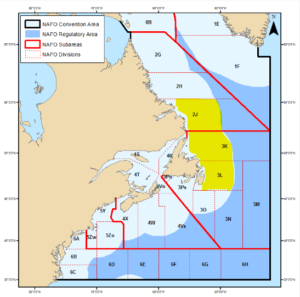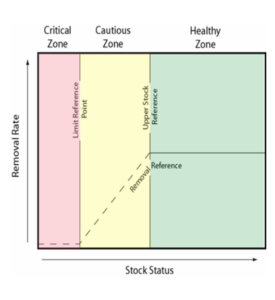Today, Fisheries and Oceans Canada (DFO) held a technical briefing on the 2024 science assessment for the 2J3KL Northern cod stock off the northeast coast of Newfoundland and Labrador. The science assessment was peer-reviewed last week and Northern cod was determined to be within the Cautious Zone in 2024, at around 20% above the Limit Reference Point (LRP). Fishing mortality (i.e., the removal of fish from the stock due to fishing) remains very low, consistent since the early 2000s, having little impact on the overall stock status.
“Based on the latest assessment, we see some positive signals in the stock, including a wide range of ages, above average cod condition, and continued recruitment. Additionally, the ecosystem surrounding Northern cod continues to be positive for organisms at the base of the food chain like phytoplankton and zooplankton,” says Vanessa Byrne, Director of Fisheries Management and Science at the Atlantic Groundfish Council.
This past fall (2023) was the first time since 2020 that DFO were able to complete the Research Vessel survey in 2J3KL. The scientific information collected during this survey is one of the main data inputs used in the assessment of the stock. While the completion of the survey is positive news, unfortunately, it was conducted several weeks early in the 2J and 3K areas. An earlier survey timing likely means a portion of the cod stock was still closer to shore (where the survey does not go) and was therefore missed by the survey.
This is the first year that Northern cod was assessed and will be managed according to the revised Limit Reference Point (LRP). The LRP is the line between the Critical Zone and the Cautious Zone. The revised LRP was the outcome of a science review that used a wider suite of data and a more complete timeline for the iconic stock. As a result, Northern Cod is now considered to have been in the Cautious Zone since 2016.
“As an industry, we are adjusting our lens on Northern cod to reflect this change in stock status. From a sustainability perspective, resource management is different for a stock in the Critical Zone versus that of a stock in the Cautious Zone,” added Steve Devitt, AGC’s Director of Sustainability.
Alberto Wareham, President & CEO of Icewater Seafoods maintains a long-term view on cod. The Arnold’s Cove, NL company has continued to keep Newfoundland and Labrador cod in premium global markets for decades.
“We are optimistic about the future of cod in this province. As a company, we continue to invest in cod, from a science and sustainability perspective, as well as a processing quality perspective,” Wareham explained. “My family has been in the cod business for generations and Icewater Seafoods is incredibly proud to have 200 local employees whose expertise in cod processing turns heads in markets around the world.”
Following last week’s science assessment and today’s technical briefing, AGC and its members are preparing for DFO’s Northern Cod Advisory meeting this week. At those advisory meetings, industry stakeholders will make their recommendations for management measures for the fishery.
Northwest Atlantic Fisheries Organization (NAFO) Areas Map

DFOs Precautionary Approach
